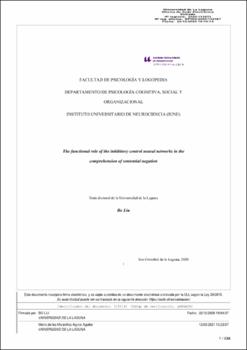The functional role of the inhibitory control neural networks in the comprehension of sentential negation.
Author
Liu, BoDate
2021Abstract
The current doctoral dissertation aims to explore the neurophysiology of linguistic negation by investigating the functional role of the inhibitory control neural networks during negation processing. Through three experiments, the dissertation managed to demonstrate the robustness and generalizability of the Reusing Inhibition for Negation (RIN) hypothesis: confirming some of its predictions with different languages (Spanish and Mandarin), showing the mutual influence of understanding sentential negation and response inhibition tasks (negation preceding or following inhibition) and expanding the scope of domains to which the RIN hypothesis applies (action-related imperatives and existential sentences).
The research reported in this doctoral dissertation confirms that the primitive inhibitory control neural mechanisms of human beings are reused for the functional purpose of understanding linguistic negation.
1. Sentential negation in Mandarin modulates the inhibition-related N2 component of the ERPs in inhibitory context (NoGo trials) with an estimated source in the inhibition-related rIPL, confirming a negation-to-inhibition priming effect.
2. The recycling of inhibitory neural resources for negation applies to both alphabetic Indo-European languages and logographic Mandarin, which differ significantly in their neural demands, thus confirming the cross-linguistic generality of the RIN hypothesis.
3. The presetting of an inhibitory state by a NoGo cue before the sentence modulates the ERP waveform of sentential negation, suggesting that negation prolonged the inhibitory state. That is, there is an inhibition-to-negation priming effect.
4. The above inhibition-to-negation priming complements the negation-to-inhibition priming reported in the literature and in this dissertation, allowing the establishment of a bi-directional influence between the two processes which reinforces the RIN hypothesis.
5. Negation in existential sentences also modulates the inhibitory control processes required by a Go/NoGo task as is the case with action-related imperative sentences, which is reflected in the inhibition-related P3 component of the ERPs with the likely generators of such effect localized in the inhibition-related SMA/pre-SMA and mid-cingulate cortex.
6. The applicability of the RIN hypothesis is not constrained to action language or imperative sentences but also extends to purely declarative existential contents, indicating that the reuse of inhibitory control mechanisms for negation comprehension is domain-general rather than content-specific.





